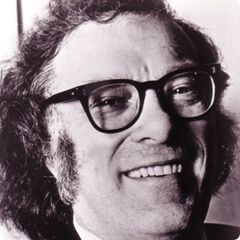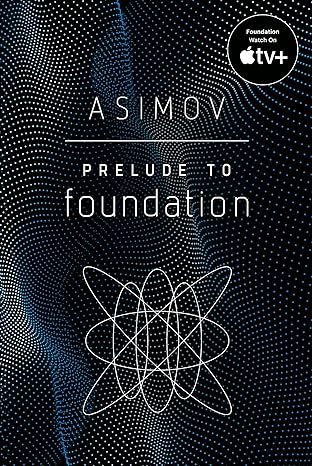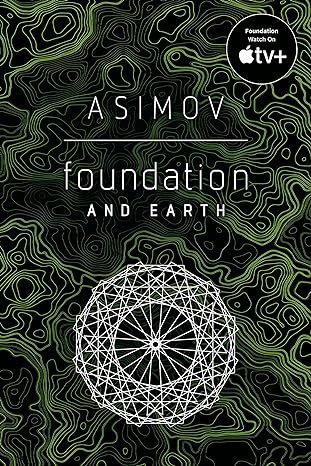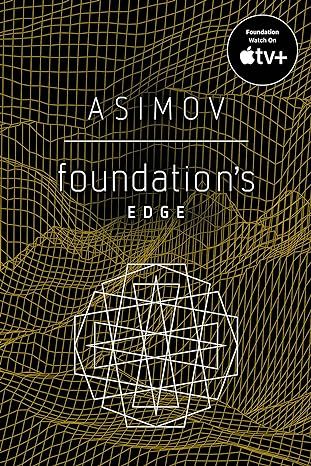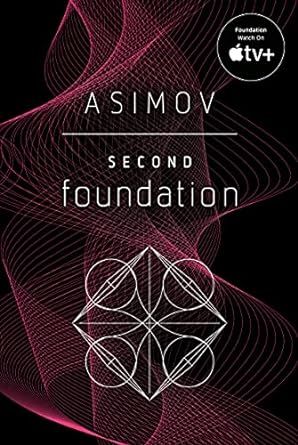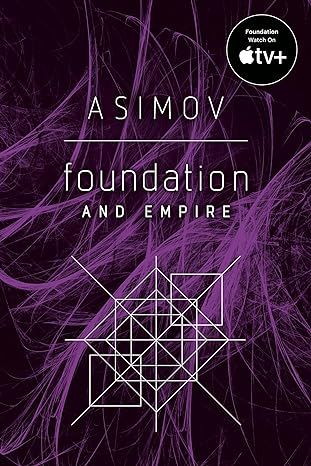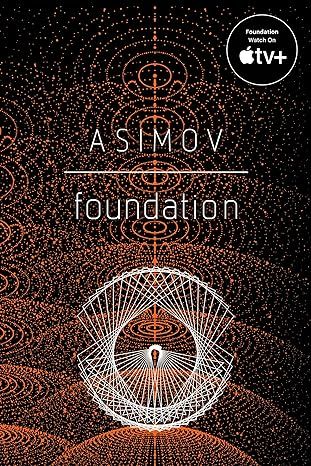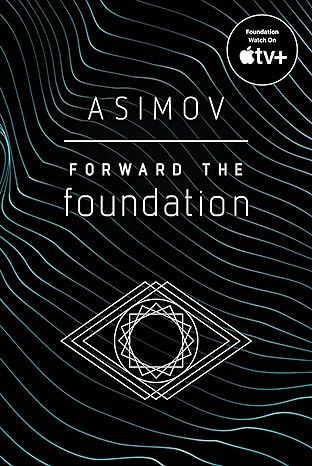
Forward the Foundation
4.6 out of 5
4,287 global ratings
The second of two prequel novels in Isaac Asimov’s classic science-fiction masterpiece, the Foundation series
THE EPIC SAGA THAT INSPIRED THE APPLE TV+ SERIES FOUNDATION
As Hari Seldon struggles to perfect his revolutionary theory of psychohistory and ensure a place for humanity among the stars, the great Galactic Empire totters on the brink of apocalyptic collapse. Caught in the maelstrom are Seldon and all he holds dear, pawns in the struggle for dominance. Whoever can control Seldon will control psychohistory—and with it the future of the Galaxy.
Among those seeking to turn psychohistory into the greatest weapon known to man are a populist political demagogue, the weak-willed Emperor Cleon I, and a ruthless militaristic general. In his last act of service to humankind, Hari Seldon must somehow save his life’s work from their grasp as he searches for its true heirs—a search that begins with his own granddaughter and the dream of a new Foundation.
About the authors
Isaac Asimov
Isaac Asimov was an American author and professor of biochemistry at Boston University, best known for his works of science fiction and for his popular science books. Asimov was prolific and wrote or edited more than 500 books and an estimated 90,000 letters and postcards. His books have been published in 9 of the 10 major categories of the Dewey Decimal Classification.
Asimov wrote hard science fiction and, along with Robert A. Heinlein and Arthur C. Clarke, he was considered one of the "Big Three" science fiction writers during his lifetime. Asimov's most famous work is the Foundation Series; his other major series are the Galactic Empire series and the Robot series. The Galactic Empire novels are explicitly set in earlier history of the same fictional universe as the Foundation series. Later, beginning with Foundation's Edge, he linked this distant future to the Robot and Spacer stories, creating a unified "future history" for his stories much like those pioneered by Robert A. Heinlein and previously produced by Cordwainer Smith and Poul Anderson. He wrote hundreds of short stories, including the social science fiction "Nightfall", which in 1964 was voted by the Science Fiction Writers of America the best short science fiction story of all time. Asimov wrote the Lucky Starr series of juvenile science-fiction novels using the pen name Paul French.
Read more
Reviews
Sayel Cortes
5
Skillfully recounting the life of Hari Seldon
Reviewed in the United States on May 23, 2024
Verified Purchase
Following the life of Hari Seldon, the fall of the empire and the beginning of the foundation develops. A story that takes place in one planet but defines the future of the empire crosses through decades of political challenges. Asimov skillfully takes us through all this being careful not to overwelm us in details, but carefully describing the line that guides the story
Read more
William S. Morris
5
Prophetic
Reviewed in the United States on October 15, 2023
Verified Purchase
This book, published in 1993, seems as if it is talking about modern history. The deterioration of Trantor sounds like what is happening in San Francisco in present times. As I am reading about Hari's manipulation of the tax code, I'm reading in the news about congress's desire to simplify the tax code. Clearly this book is before 23 and me. I thought it was a book by Asimov that I read about the genetic code, but Hari's problems with determining Wanda's genetic profile is amusing in light of today's ability to get a genetic profile within a week after spitting into a tube. Despite this problem, the story is fascinating. It's also sad as time marches on in the story.
Read more
Ron Carey
5
Cover matches my collection of the other six books
Reviewed in the United States on March 31, 2024
Verified Purchase
I liked the fact that this book matches and completes my Asimov set of the six other Foundation books. That is the reason why I purchased this one, and I am replacing my "trade paperbacks" with the larger "paperback" versions because the print is bigger. No issues with the quality whatsoever, and the price is right.
Kindle Customer Guzzialfa
5
Asimov: The most prolific author of all time & the Foundation Series is probably his best work!
Reviewed in the United States on April 21, 2022
Verified Purchase
This is titled Forward the Foundation. A prelude to the Foundation series and written after the five books of the Series. It was billed as Forward the Foundation II so I bought this Kindle edition wondering how I could have missed one. Now I think it may just be the Kindle version of the original, which of course it is not. Prelude to Foundation precedes this indeed. This is Forward the Foundation and follows Prelude in time but at the end in books written. That said, I may need to address the Prime Radiant to determine how this is. Doesn't matter. It's time to read the series all over again. Read themN in order written or in time line order. Its great either way. Wait, could it be? Am I having a Hari Seldon moment? The man did coin the term Robotics after all.
Read more
Regis
4
Marvellous Conclusion to the Series
Reviewed in the United States on January 24, 2021
Verified Purchase
By a terrible coincidence, I read this book that talks about mobs acting irrationally when guided by messianic leaders (in the book, the leader is Jo-Jo Joranum) exactly when mobs in Washington, DC stormed Capitol Hill. This alone renders a completely new meaning to Foundation in general and 'Forward' in particular.
Anyone who has minimal familiarity with Isaac Asimov's saga knows that Hari Seldon predicts through psychohistory that the Galactic Empire is in a state of decay and decline and that he works to remedy the consequences of a such decay. But it is only here, in 'Forward', that it becomes clearer that Hari Seldon decides to write the Galactic Encyclopedia because he wants to preserve culture and all human knowledge, as he believes those are destroyed when civilization falls apart (pretty much as symbols of democracy at Capitol Hill were damaged by the mob). Maybe Asimov was only echoing something dark that was happening in the early 1990s, but the message is still quite strong to our current reality. It is like Margareth Atwood's 'Handmaid's Tale', published in 1985 and amazingling relevant to this date.
While 'Forward' is a much slower book than the best ones in the Foundation series, it is still a very nice and fulfilling closure. Structurally, it is closer to the first 'Foundation', which is not necessarily a good thing, with many jumps in time (from Hari Seldon at 40 with Eto Demerzel, then at 60, and finally at 70), short chapters and a sort of less laborious style, some chapters consisting almost of dialogs only.
But 'Forward' sounds all the time more personal and intimate than anything else in the Foundation series, and the fact that the Epilogue is written in first person reinforces that feel. It is Isaac Asimov's farewell, as much as is Hari Seldon's farewell. The whole book deals with the idea of growing old and witnessing the decay of the body and the losses that come with them, and that covers the whole book with a bitter-sour and sad taste, something that I also felt in 'Star Trek Picard' (and I like the Amazon series very much). As Hari Seldon ages and misses his beloved ones, it is impossible not to stop to imagine how Isaac Asimov himself was facing his own elderliness, when "even if he could look forward to some additional decades, the years of his most fruitful breakthroughs were surely behind him." With that as underlying context, it is impossible not to feel attached to the book and forgiving of any flaws it might have.
Many argue about the pros and cons of reading the Foundation series in publication order or chronological order (as the events in the two last published books 'Prelude' and 'Forward' occur before those of the first 'Foundation'). I am definitely for publication order.
Not that reading the books in chronological order would cause any harm. Asimov did envision that the books might be read in chronological order and very competently managed to write all books so that none of the mysteries and secrets in 'Second', 'Edge' or 'Earth' is taken for granted in 'Prelude' and 'Forward' (in particular, the whole mystery about "Star's End" is carefully preserved in 'Forward'). Moreover, reading 'Forward' first could enrich the understanding of later books, in particular the origins of The Mule in 'Empire' and the references to the Robot Series in 'Edge' and 'Earth'. So the pleasure of reading in chronological order or publication order may work just the same. Indeed, the temptation to start (re)reading the first 'Foundation' after finishing 'Forward' is almost irrestible, which is exactly what I did, and I must confess that I liked the first part of 'Foundation' much more the second time, as the whole description of Trantor seemed so well connected with that in 'Prelude' and 'Forward'.
However, there is one experience that only those who read the books in publication order will have: the pleasure of concluding a long journey of seven books by reading the very last words of 'Forward'. As I was advancing the last chapters, that was exactly the way I felt, that I was indeed concluding a journey with Asimov himself (and I would have been very happy already if the book ended in Chapter 33 of Part 4, which is one of the best chapters in the book).
That is why I say that nothing compares with the feeling I had when I turned the very last page of the Epilogue of this book and read Asimov's book dedication.
I could only feel the tears in my eyes with a silent gratitude.
Read more
9 people found this helpful
Top Isaac Asimov titles
Best Sellers

The Great Alone: A Novel
4.6
-
152,447
$5.49

The Four Winds
4.6
-
156,242
$9.99

Winter Garden
4.6
-
72,838
$7.37

The Nightingale: A Novel
4.7
-
309,637
$8.61

Steve Jobs
4.7
-
24,596
$1.78

Iron Flame (The Empyrean, 2)
4.6
-
164,732
$14.99

A Court of Thorns and Roses Paperback Box Set (5 books) (A Court of Thorns and Roses, 9)
4.8
-
26,559
$37.99

Pretty Girls: A Novel
4.3
-
88,539
$3.67

The Bad Weather Friend
4.1
-
34,750
$12.78

Pucking Around: A Why Choose Hockey Romance (Jacksonville Rays Hockey)
4.3
-
41,599
$14.84

Start with Why: How Great Leaders Inspire Everyone to Take Action
4.6
-
37,152
$9.99

Tomorrow, and Tomorrow, and Tomorrow: A novel
4.4
-
95,875
$13.99
